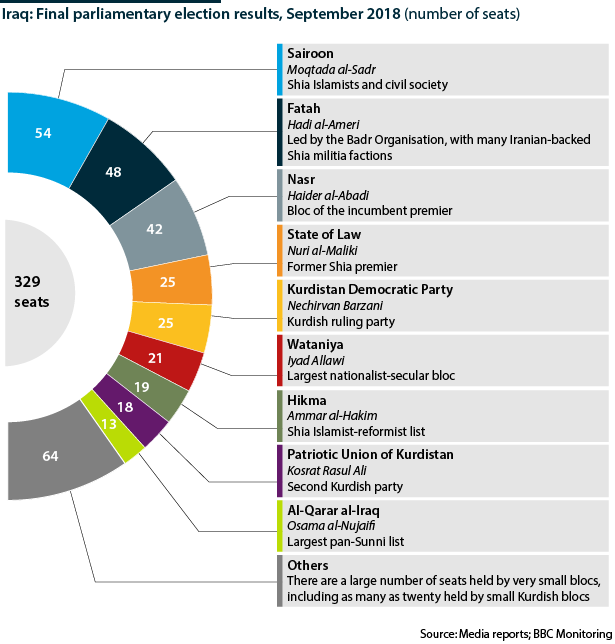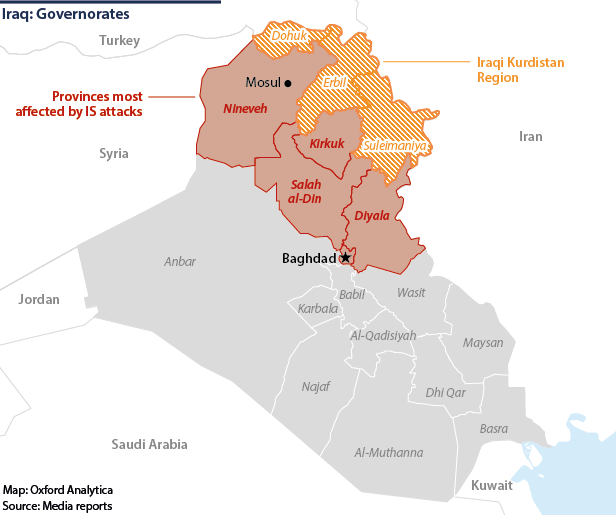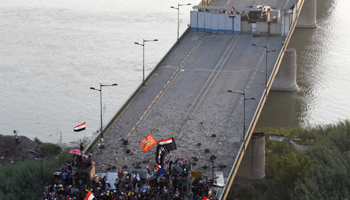Prospects for Iraq in 2020
Popular demonstrations bring short-term uncertainty but cannot address long-term stagnation
Current protests will eventually peak and decline, following government concessions. Whether Iraq experiences a change of prime minister in late 2019 or new waves of repression, the same formula of intra-Shia fragmentation will deadlock national politics in 2020.
What next
Significant disruption will delay the 2020 budget and other decisions, as pressure mounts on Prime Minister Adel Abdul-Mahdi to resign or move into a caretaker role pending early elections in 2020. Reshuffles of senior officials are likely, but powerful sectarian parties will protect their own interests.
Strategic summary
- Iran-backed militias will gain a much tighter grip over the government and security forces, drawing more US sanctions.
- Baghdad and the Kurdistan region may struggle to maintain their revenue-sharing deal if the premier is removed.
- The budget will expand as the government tries to buy the patience of the electorate.
- Islamic State (IS) will not experience a major resurgence in Iraq in 2020, despite new instability in Syria.
Analysis
The coming year will see fragile government stability, a bloated budget, shifting security threats and ongoing diplomatic re-engagement with the region.
Government survival
Abdul-Mahdi became prime minister in 2018 as a compromise candidate between the two largest parliamentary blocs -- those of Moqtada al-Sadr (Sairoon) and Hadi al-Ameri (Fatah, linked to pro-Iranian militias).
However, amid mounting protests, Sadr, the Shia religious establishment and the general public have now lost confidence in the prime minister, leading to a period of crisis and uncertainty (see IRAQ: Protests will drive populist economic response - October 10, 2019). There are four main scenarios:
- Tehran is pushing Baghdad to view the protests as a foreign plot and mount a crackdown. Pro-Iranian leaders could back the premier and scatter the protesters, offering Sadr concessions to bring him back on board.
- However, if Abdul-Mahdi feels that he is no longer supported, he could easily resign, either effective immediately or until a replacement candidate is agreed between the factions and approved in parliament.
- Alternatively, the focus could shift to early elections, likely after the passage of a new 'election code' including a revised election law and political parties law. This could leave Abdul-Mahdi as caretaker premier through 2020, as legislators will be unwilling to cut short their appointed terms.
- If the premier hangs on beyond 2020, though, it may no longer seem worth the effort to remove him. If reform efforts spiral into a wider debate about constitutional amendments or redesigning the electoral system, the timeline could easily slip until the next scheduled elections in early 2022.
In any case, 2020 will be marked by uncertainty over the future of the prime minister and cabinet. The most critical roles -- ministers of oil, electricity and finance -- will likely be protected. Reshuffles will affect less influential ministers, their deputies, the heads of independent commissions and the directors of intelligence agencies.
Expansionary budget
Amid protests, the government will likely attempt to bribe the populace with a bloated 2020 budget that generates an unusually large deficit.
Up to 3.5 million people (of a population of 39 million) will receive new benefits in a major social welfare expansion. This -- combined with promises of more state jobs -- will boost current spending in 2020 and beyond, undermining macroeconomic stability and worrying the IMF and World Bank.
Government borrowing will rise sharply
To fund this, parliament will approve deficit financing through sovereign reserve drawdowns, as well as domestic and external borrowing. Costs will be high, as Iraq will not be able to use soft loans earmarked for infrastructure. However, smaller investment projects will continue to be funded, with a focus on finishing partially-completed projects that deliver social goods such as jobs, training, services and housing.
In return for a larger share of the state budget, the Kurdistan Regional Government (KRG) has committed to provide Baghdad's oil marketer with at least 250,000 barrels per day of oil in 2020 (see IRAQ: New Kurdish government will deepen federal ties - July 22, 2019). This deal was strongly identified with Abdul-Mahdi, and its survival if he resigns is not assured. In that scenario, the KRG might receive a lesser budget share and thus retain its oil, triggering a renewed legal battle.
Security shift
An IS resurgence in 2020 is unlikely, owing to:
- the presence of the US-led coalition, which is likely to remain, despite occasional parliamentary threats to vote for its removal;
- the activity of Iraq's own security forces and militias, despite some politicisation of leadership; and
- most importantly, Sunni populations' deep wariness of IS after living under the 'caliphate', which has left its recruitment potential at an all-time low.
Attacks will remain at a low level by historical standards, with occasional bombings in smaller northern cities and a persistent but inconsequential pattern of security incidents in rural areas.
The unsettled situation in Syria will not allow IS to regroup, as US, Syrian, Russian and Turkish forces will parcel up the area. The border with Iraq will be partially secured on both sides.
A more pressing security concern will be the growth of state-backed, Iran-leaning militias (see IRAQ: Measures to rein in militias will be cosmetic - August 19, 2019). In 2020, these units -- under the rubric of the state-run Popular Mobilisation Forces (PMF) -- will see a budget increase (above 2019's 2.19 billion dollars) and rise in manpower (to the 150,000 who are actually serving, above the 135,000 currently on payroll).
This will come at the expense of the conventional security agencies such as the army, counter-terrorism service, police, federal police and intelligence services. The PMF will take over more security responsibilities in Baghdad, on the Syrian border, at customs posts and in oil-rich Basra province.
Interference by pro-Iranian militias could weaken the security services
Army, counter-terrorism service and police commanders will face real pressure to kowtow to militia leaders or be replaced. Restrictions will be set on interactions between the US-led coalition and the conventional security agencies, hampering their efficiency.
International outreach
Beginning with improved relations with Kuwait, Baghdad has pursued a determined re-engagement with regional diplomacy (see IRAQ/SAUDI ARABIA: Rapprochement may proceed gradually - May 30, 2019). This is a rare point of consensus in Iraqi politics and will continue in 2020, spearheaded by President Barham Salih, even amid an unsettled domestic political scene.
Turkish arbitration
In the first quarter of 2020, Baghdad will see the resolution of its arbitration in the International Chamber of Commerce against Ankara for allowing the KRG to export oil through the Iraq-Turkey pipeline. The case will either be settled shortly before the award or offset by a major Iraq-Turkey trade and cooperation deal shortly afterwards. The deal is set to include Turkish reconditioning of the pipeline for expanded use, electricity provision, additional diversion of Turkish river water to Iraq, and increased trade and investment from Ankara.
Neighbours initiative
Negatively affected by regional tensions, Baghdad will seek to draw together its neighbours for cooperation and dialogue. It will volunteer to act as a go-between for Iran and Saudi Arabia, with the latter set to increase its trade and investment in Iraq and also begin providing electricity. A planned Iraq-Jordan oil and gas pipeline could move ahead.
Iranian influence
Relations with Iran could become a flashpoint. Tehran's influence and activism within the government and security forces is rising rapidly.
However, there is new pushback from Iraq's own Shia religious establishment as well as the public. The leadership emerging from current protests may seek to negotiate a visible reduction in Iranian influence by lowering the profile of key PMF leaders.
Coalition commitment
The US-led coalition will stay in Iraq through 2020 to fight IS. The UN, EU and NATO will deepen engagement advising on security sector reform and electoral rules -- projects seen as low-cost, low-risk and therefore sustainable.



